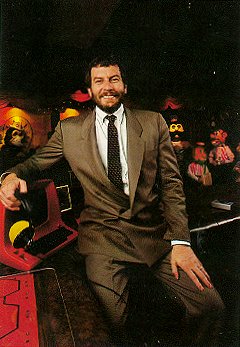|
| olution, games in which the player matches wits with an intelligent machine. They may also turn out to be more than that. With the continuing decrease in the cost of the hardware, the games have got more and more sophisticated. A recent Atari game called Battlezone has three processors running it. In order to play some of these games, many players develop styles of thinking and seeing that they do not ordinarily use. Out in the arcades now, MIT sociologist Sherry Turkic has been watching the players. "I think they are learning a lot of spatial thinking, a lot of geometrical thinking," she says. "What I see is an experience that great athletes have, where they can allow their bodies to think for them. The games are giving that experience to larger numbers of people. With good players their fingers are doing the thinking." The games are also teaching a lot of people that computers can be playful, she points out. At the Claremont Graduate School in a Los Angeles suburb, psychologist Robert S. Gable suspects that the players he sees in the arcades may be thinking with faculties even more surprising than their fingers. "The game players are intellectual and social mutants," he says. He sees their play as a form of learning that may |
His words are echoed by Michigan's James McConnell, whose introductory textbook on psychology is currently a best seller on college campuses. "Go into one of the arcades and watch the students there play," McConnell advises. "They're being challenged in strange sorts of ways, and they're vocal and emotional about it. And then go to the library, and watch the kids sitting in a row, and they aren't smiling and they aren't enjoying anything, and if they did, if one of them got an insight from reading a book and stood up and yelled 'Eureka!' they'd throw him right out of the place."
Are those psychologists saying the arcades are the new schools for survival? Is it somehow more valuable to learn Missile Command than to learn English?
To know that, you may have to hit hyperspace. Hyperspace is a concept introduced in early science fiction and used in some of the first computer video games, whereby you disappear from your current frame of reference and reappear in the same world but in a different dimension of space or time, or at least at different coordinates on the screen. It is not a perfect concept. There's a chance you will blow up on reentry. But sometimes it's worth trying.
.Hyperspace. And reenter in the weatherbeaten barracks office of Major Dave Robinson, a trim armored cavalry officer who, as he gets up from his desk, looks as if he might shoot right through his own flat-cut hair. Until recently, he says, the only video game he can recall playing was an early tank game, years ago in a bar. At the moment. Major Robinson is assigned to the Army Training Support Center at Fort Eustis, Virginia, a field office of TRADOC, the Army's Training and Doctrine Command, and his mission is to explore the effectiveness of a modified Atari arcade game in gunnery instruction.
In the arcades, they're all volunteers
Major Robinson's orders came down from the commander of TRADOC, General Donn Starry, who was struck by what he saw in the video game arcades. "I see a lot of people in those arcades learning something," Robinson recalls the general's words, "and they're all volunteers, and they're paying a quarter to learn whatever it is they learn from these machines. I don't know what they learn, but I'm convinced they learn something, and that the Army needs to exploit it." An Army study group selected the Atari game Battlezone as a candidate for training use, and Major


